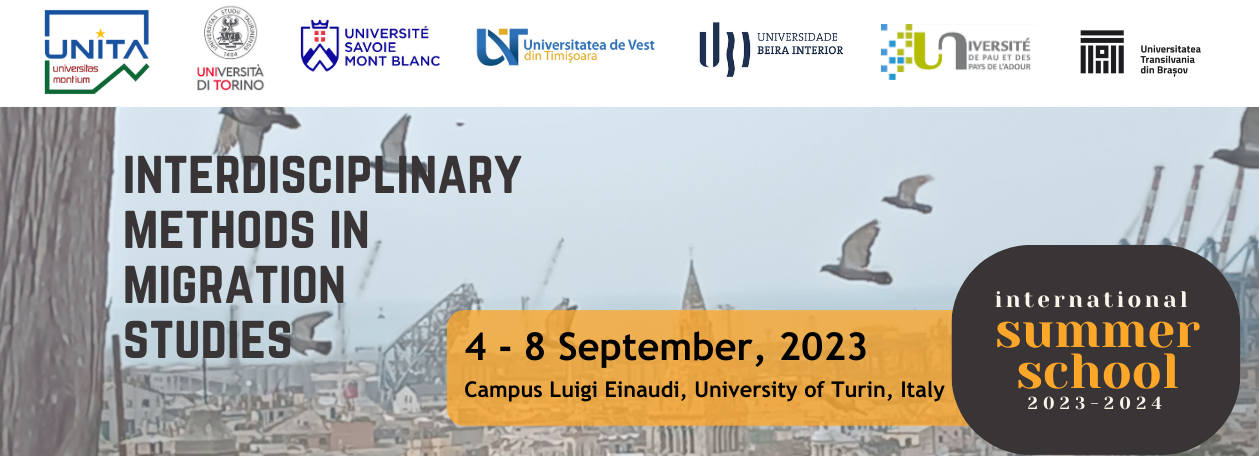
|
|
|
Program > September 7SEPTEMBER 7, 20239.00 - 12.00 Guido Tintori Organization for Security and Co-operation in Europe (OSCE). Office of the Co-ordinator of Economic and Environmental Activities Building on more than a 10-year of personal experience working at the interface of research and migration-related policy, the lecture addresses critically the ways in which academic research becomes a resource for policy-making. Thematically, the lecture focuses on policies for the governance of migration flows, as well as public opinion and narratives on migration. The second part of the session is structured as a workshop with a focus on research methodology in migration studies from a political and social perspective in the European context. It provides an introductory level hands-on experience on sources, data and analytical tools that contribute to sound scientific evidence on real-world issues. The aim of the workshop is to enhance participants’ capacity to identify and access the relevant sources for migration-related analyses.
Grant writing in migration studies Roberta Ricucci Università di Torino The lab aims to endow participants with conceptual and methodological tools that help them develop their skills in writing a successful project in order to be successful both in a research grant application as well as in a innovation action activities, spanning from educational centers to welcoming initiatives, from refugees to economic migrants, from unaccompanied minors to second and other generations with a migratory backgrounds. Topics will include: • Different kinds of projects and different kinds of financial opportunities. • How to read and analyze the various call for proposals, both at National and International levels; • Devising a provisional list of contents and organizing the writing into the subsequent steps and tasks. • How to define a coherent and sustainable budget. Participants will develop greater awareness of the existence of a plurality of ways to plan and write a project considering the various topics in migratory studies. More specifically, through an active participation, participants will gain basic methodological knowledge that will help them to increase their ability: - to sort out what is fundamental in a call for proposal; - to write effectively; - to define a coherent budget proposal; - to articulate and structure consistently a fairly long text such as a research proposal, avoiding rigid schemes.
14.00 - 17.00 Gender & migration in social science: issues, concepts, methods Linda Guerry Laboratoire de Recherche Historique Rhône-Alpes (LARHRA)/Institut Convergences Migrations/Institut National d’Études Démographiques (INED), Paris This lecture will present the historical evolution of migration studies in different disciplines (sociology, geography, political science, anthropology and history). Constructed as a synthesis of past and present approaches, it will focus on research on women and gender: emergence in the 1970s, broadening of the horizon (1990s) and new approaches since the 2000s. Examples of recent research on migration with a gendered dimension will be presented and discussed with students.
Computational linguistic resources and methods for analyzing hate speech and misrepresentation in social media discourse on immigrants Viviana Patti Università di Torino The lecture will give an overview of the computational linguistics state-of-the-art resources and methods to analyze and detect automatically hate speech against immigrants and implicit phenomena such as stereotypes and prejudices about immigrants in social media in different languages (Italian, English, Spanish, French). It will address how to develop a pipeline for a social media corpus to study topics related to migration works (data collection, annotation, evaluation cycle). It will introduces students to corpora and computational linguistics methods for analyzing and monitoring hate speech against immigrants and misrepresentation in discourse on immigrants with a special focus on social media, without neglecting their role within the entire media communication ecosystem. The approach will be multilingual in order to encourage cross-cultural comparison and the issue of intersectional hate will be raised.
Theme: Health & migration Methods in migration studies Interdisciplinary focus Plenary session
|

